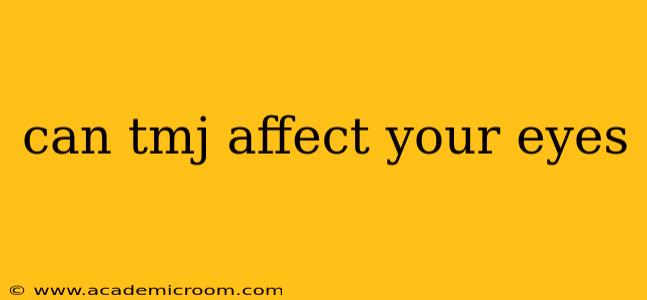Can TMJ Affect Your Eyes? Exploring the Connection Between Temporomandibular Joint Disorder and Eye Problems
Temporomandibular joint disorder (TMJ) is a condition affecting the jaw joint and surrounding muscles, causing pain and discomfort. While the primary symptoms are centered around the jaw, many sufferers report experiencing symptoms seemingly unrelated to their jaw. A common question is: Can TMJ affect your eyes? The short answer is yes, although not directly. The connection is indirect and involves the complex network of nerves and muscles in the head and face.
This article explores the potential link between TMJ and eye problems, addressing common questions and providing clarity on this often-misunderstood relationship.
How Can TMJ Impact My Eyes?
TMJ doesn't directly cause eye problems like cataracts or glaucoma. However, the tension and pain associated with TMJ can lead to several secondary eye issues. This happens due to the intricate network of nerves and muscles connecting the jaw, face, and head.
-
Headaches and Migraines: One of the most prevalent symptoms of TMJ is headaches, often migraines. These headaches can cause eye pain, pressure, and sensitivity to light (photophobia). The intense pain can also lead to blurred vision or even temporary vision changes.
-
Muscle Tension: Chronic TMJ can lead to significant muscle tension in the face, neck, and shoulders. This tension can impact the muscles around the eyes, potentially causing eye strain, headaches, and even affecting the alignment of the eyes (though this is less common).
-
Referred Pain: Pain from TMJ can be referred to other areas of the body, including the eyes. This means that the pain originates in the jaw joint but is felt in the eyes. It's like a phantom pain, where the sensation is felt in a location different from the source of the pain.
-
Stress and Anxiety: The chronic pain and discomfort of TMJ can significantly increase stress and anxiety levels. This added stress can exacerbate existing eye conditions or contribute to new ones due to the body's overall tension.
What are the Symptoms of TMJ Affecting the Eyes?
The symptoms aren't always immediately obvious, and often overlap with other conditions. Common symptoms potentially linked to TMJ include:
- Eye pain or pressure: This can range from mild discomfort to severe throbbing pain.
- Headaches, particularly those affecting the temples or behind the eyes: These can be tension headaches or migraines.
- Blurred vision: This is often temporary and related to muscle tension or stress.
- Sensitivity to light (photophobia): This is particularly common with accompanying migraines.
- Eye strain and fatigue: This can be due to the constant muscle tension around the eyes.
Can TMJ Cause Double Vision (Diplopia)?
While less common, it's possible to experience double vision indirectly due to TMJ. Severe muscle imbalances in the face and neck could potentially affect eye muscle coordination, resulting in temporary diplopia. However, double vision is more frequently associated with other neurological or eye conditions. If you experience double vision, it's crucial to consult an ophthalmologist to rule out other causes.
How is TMJ-Related Eye Pain Diagnosed?
Diagnosing TMJ-related eye problems requires a thorough evaluation by both a dentist specializing in TMJ disorders and an ophthalmologist. The dentist will examine your jaw joint, assess your bite, and check for muscle tenderness. The ophthalmologist will perform a comprehensive eye exam to rule out other eye conditions. They may also ask about your TMJ symptoms to establish a potential link.
What are the Treatment Options?
Treatment for TMJ-related eye problems focuses on managing the underlying TMJ disorder. Treatment options may include:
- Medications: Pain relievers, muscle relaxants, or anti-inflammatory drugs.
- Physical therapy: Exercises to strengthen and relax jaw muscles.
- Splints or mouthguards: To help realign the jaw and reduce stress on the joint.
- Lifestyle changes: Stress management techniques, improved posture, and dietary adjustments.
It's vital to remember that this information is for educational purposes only and does not constitute medical advice. If you are experiencing eye pain or discomfort along with TMJ symptoms, consult with your doctor or a qualified healthcare professional for proper diagnosis and treatment. They can help determine if your eye symptoms are related to TMJ or another underlying condition.
